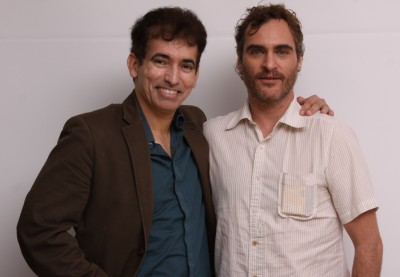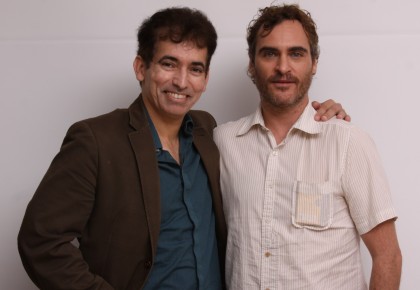
Recently Joaquin Phoenix rattled the film industry when he dismissed the Academy Awards during an interview with Interview magazine, as ‘bullshit’ and the ‘worst-tasting carrot’ he had ever had in his whole life. But when I chat to him at the Four Seasons Hotel in Beverly Hills where he has come to promote his new movie The Master, the two-time Academy nominee denied using the word carrot.
“I don’t know what the context of the conversation was. I don’t remember,” he says, recomposing himself. “I think there’s a lot of truth and wonderful things that are said at the awards and sometimes there are candidates that really deserve the kind of recognition up there, but often times there is the elements of political campaigns that feel false. I think that kind of phoniness overwhelms me and I think that’s maybe what I meant, but, listen, there are wonderful artists that wouldn’t have the opportunity to create if it weren’t for the recognitions that they get so it’s certainly not all bullshit.”
Phoenix’s main disdain for awards stems from their seductive nature, which he thinks everyone is susceptible to. “It breeds a sense of awareness that is not good, particularly when that becomes the goal of actors. So there are some potential hazards that I think you have to be aware of to not let it go to your head,” warns Phoenix, his shirt crumpled, his hair uncombed, his beard thick.
Having said that, Phoenix appreciates the profound positive impact his Oscar nominations – for portraying Johnny Cash in Walk The Line (2006) and Commodus in The Gladiator (2001) – have had on his life. “It’s undeniable that my career would be in a very different place if it wasn’t for that experience,” he says. “Typically I haven’t been in films that have made an exorbitant amount of money and that’s typically how actors oftentimes are allowed to continue to do quality work as they are considered successful.”
Nonetheless, the social aspects of the nominations were too uncomfortable for him to bear. “I don’t want to be around 200 people where you just make small talk,” he exclaims, waving his hand dismissively. “You’re going like fuck, I just spent 8 hours at this thing and I was with all these people and I never talked to anybody really. I don’t like that feeling; you always kind of leave feeling a little empty.”
Having won the best actor award at this year’s Venice Film Festival, Phoenix may have to do it all over again this year thanks to his Oscar-worthy performance in Paul Thomas Anderson’s The Master, in which he plays a wayward WWII veteran, Freddie Quell, who falls under the spell of a charismatic sect leader, Lancaster Dodd (Philip Seymour Hoffman). But the star insists that an actor’s performance is not solely the fruit of his talent and it should be credited to the director who guides him through the filming, the director of photography who makes him look good and the editor who selects his best takes.
“Sometimes, I think actors don’t really deserve credit for the performances in some ways because I’ve seen performances shaped so much by the director,” Phoenix exclaims. “I guarantee you that if you saw the unedited film, I don’t think you would talk about my performance in a positive way. I think you might say that there were some moments that were good and then you’d say there were things so fucking bad that you can’t imagine that I’m a paid actor. So it’s hard for me ever to take credit for a performance,” he laughs.
Yet, Paul Thomas Anderson told me earlier that he offered the 37-year-old actor little direction, allowing him to freely form the character as he saw fit. “Paul’s really humble,” Phoenix chuckles, shaking his head. “I know that he feels that he’s very free and doesn’t control things but he does in a very subtle way to allow actors to feel that it is their own experience. I think that really good directors sometimes won’t directly say do this but they give you information that you can derive something about the character.”
Phoenix confesses that although he found Freddie’s yearning for meaning in his life and his uncertainty exciting, he had no idea how to approach him when he read the script. “There is a lot of ambiguity and so there’s a lot to try and develop. It was such an interesting character because I never really had any clear answers for what motivated him. Typically, actors have all those cliched stupid questions that actors ask and I didn’t really have that. I was mostly attracted to it because I didn’t know what it was, which was scary.”
But after listening to songs that were sent to him by Anderson, Phoenix began gradually to shape Freddie’s character emotionally and physically. “I can’t remember the songs, but every song was about these broken men and the lyrics clued me in.
“I wanted him to be physically and emotionally damaged so it was like the toughest case possible which would be appealing to The Master. That he seems like a hopeless case,” explains Phoenix, who has built his career inhabiting such conflicted and broken characters.
Born in Puerto Rico in 1974 to parents who were missionaries with the Children of God, Phoenix grew in a bohemian environment. Only when his parents left the cult and moved to the US, did he and his siblings, River and Rain, begin performing music, gaining attention in local contests, which eventually lead to TV roles for himself, when he was only 10 year-old, and for his brother River, who flourished into a promising star.
Ironically, Phoenix’s first major role in feature films was in Gus Van Sant’s To Die For (1995), which he took following the tragic death of his brother River from an overdose at the Viper Room, which left the young actor with deep emotional scars, but charged him with a new energy that propelled him to stardom.
In 2009, he raised eyebrows when he announced his retirement from acting in order to focus on rap music, and began appearing in public with a scruffy beard, uncombed hair and dark sunglasses, giving the impression that he was suffering a mental breakdown. The entire episode of his fall as a movie star and his rise as a rap artist was recorded by his best friend Casey Affleck in I’m Still Here, a supposed documentary that was released in 2010.
Later Phoenix strenuously denied that he had ever retired from acting or taken on rap music, insisting that it had been an act for I’m Still Here. “You got to be fucking kidding me,” he explodes in incredulous laughter. “I don’t do music, I never have.”
Nonetheless, the experience of making I’m Still Here has profoundly changed his perspective on acting and deepened his understanding of himself. “I think that when I was younger I tried to really control my performances and I tried to really plan things out and I took a certain pride in the amount of work that I had done. At some point I felt in some ways that I was preventing myself from discovering things that maybe were beyond my understanding at the time when I was studying it and that the best thing was to study and work and come up with my plan but to be completely open to whatever may happen in the moment and that really came to pass when I did I’m Still Here and then led into this movie.”
Listening to Phoenix speaking about acting with such passion, enthusiasm and deep appreciation, one would doubt that he had or would ever contemplate quitting his coveted craft. It’s evident, however, that he loathes the inevitable social aspects and the hazardous fame that come with it.
“I don’t want to feel like I’m this different thing or that I am like special in some way; it makes me feel funny,” he reflects. “I’m shy and it’s uncomfortable, and you navigate it because you have no choice,” he laughs in resignation.
A lot has been said about Phoenix’s eccentric personality and unpredictable behaviour, which is evidently not completely untrue, but what I also sensed in him was frustration at being misunderstood, dismay at being judged and a yearning to be left alone.
